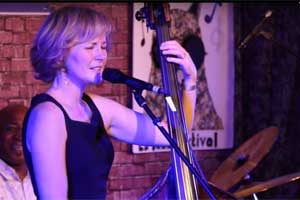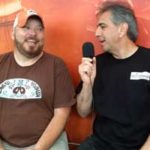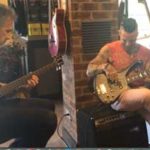Special FBPO feature about the long-time Les Paul bassist who went from local gigs in Australia to the legends of NYC
Exclusive FBPO feature
July 8, 2013
Ashley Zlatopolsky, contributing writer
(from an interview with FBPO’s Jon Liebman)
Australian jazz vocalist and double bassist Nicki Parrott, dubbed by the legendary Les Paul as having “that special gift you cannot buy in a music store,” has an ever-growing and monumental career filled with prestigious awards, countless festival appearances and an impressive roster of musicians performed with. Playing side-by-side with music greats Paul McCartney, Slash and Steve Miller, she continues to build her resume with several European tours this year. However, Parrott’s musical livelihood originated in quite a surprising way.
Growing up in a home that valued classical music, she began playing piano at the age of four, soon followed by the flute. Parrott (pronounced “pa-ROTT”) attained her love of jazz from her sister, who started bringing home jazz records one day. By the age of 12, Nicki had joined a band called “The Marching Koalas” and was marching in the Pasadena Rose Parade merely one year later. At 15, she played her first overseas gig in Japan. It was then that she picked up the bass.
“My sister had a band and needed a bass player. There was one at school… there was a bass in the band room and it needed strings. The guy across the street from me actually put some strings on it and I only had three strings. I didn’t even have four strings! He said, ‘You don’t need the fourth string’. So, I had a G, a D and an A… and I thought that was enough, until later on I realized these other bass players had one more string,” says Parrott with a laugh, further describing how she was told that the empty tuning peg on top was useless. “This was a good exercise in a way, you know, just to learn that part of the bass first. But when I added the bottom string, I was much happier!”
Parrott eventually studied under two bass legends, Ray Brown and John Clayton. Clayton served as a form of inspiration, helping her understand her passion for music and finding the true reason behind wanting to perform. At only 20 years old, she didn’t fully realize the importance behind these lessons, describing herself as naïve and simply feeling fortunate enough to partake in the studies.
Sponsored by an artist visa through Kit McClure, she traveled to New York in the mid ’90s, where she picked up the electric bass. “She [McClure] had a band that played jazz and R&B. We did a lot of reggae gigs and played a lot of parties… because there was a lot going on in New York at that time. So, I learned electric bass then and learned a lot of R&B in the ’90s. I was in an R&B band that played on the Upper West Side of Manhattan for about eight years on Wednesday night. And I sang background vocals and played electric bass. I also play occasionally now with the Les Paul Trio Monday night tribute. Also, with David Krakauer, I play electric bass. He’s a wonderful clarinetist. And with Fred Wesley,” Parrott describes.
And since Les Paul is a household name in the world of music, especially guitars, being able to have worked with him is an honor. She originally formed a trio with John Tropea and David Spinozza, in which the three decided to play Paul’s jazz night at the Iridium Jazz Club. According to Parrott, Paul told the trio, “You guys can go sit down, but leave the girl up here.” She acknowledged it as a joke, making a few jokes herself. Yet shortly after, she received a phone call from Les Paul Trio bassist Paul Nowinski, asking her to sub in his place while he went out on tour.
“After two weeks, Les said, ‘I’ll see you next week!’ And I said, ‘No, actually… I’m not on next week.’ Somehow, he ended up having me at full time. I don’t know how that went down, but that’s what happened!” she says.
Parrott played in the Les Paul Trio for 10 years, now doing the tribute show on and off at the Iridium. She describes Paul as being an entertainer, always wanting to bring the best out of musicians. And he had quite the fan base. Joining the trio at times were names such as Jeff Beck, Keith Richards, Richie Sambora, Tony Bennett and countless others. Even actors would come to the shows, such as Kevin Bacon and Renée Zellweger.
“I learned from him [Les Paul] to just keep trying. There were some weeks he really hated his playing, but he never stopped trying to play music. Even if his hands were hurting, he could play the blues like nobody else. Let’s face it – to play the blues, it’s not about how many notes you can play, it’s about playing the right ones. He knew how to entertain an audience, how to make them feel good. He knew how to do that,” Parrott says.
With a combination of her natural talent and experience working alongside some of the greatest musicians of our time, we can expect groundbreaking things from Parrott for years to come. She performed at Amsterdam’s Jazzdagen Tulip Cruise this spring, followed by a few more appearances in Europe before returning to the states.





I am reading this article by Ashley Zlatopolsky about some of Nikki Parrott’s career many years after it was written.
I’m not sure of the year, but my wife Lorraine and I sat in on a Les Paul Monday evening set at The Iridium when he was 90 years old. Nikki was the bassist that night, and for one of the band’s pieces, she played and seemed to caress the bass as she sang “I Love BIG Instruments.” We all in the audience loved and laughed during the song, but none of us any more than Les, even though he had probably heard her performance many times. He may have simply been enjoying the audience’s enjoyment.
Born in the early 40’s, we have been blessed to have seen many, many of the greats of pop music and jazz, starting with Al Hibbler singing “Unchained Melody” in Provincetown, MA in 1964, including Dizzy Gillespie, Stan Getz and Branford Marsalis in Nice, France in 1987, and Dave Brubeck at Blues Alley in D.C. when he was also 90.
We two often fall asleep at night humming or singing some of these great musicians’ pieces, so permanently etched in our collective psyches are many of these legends’ pieces.
As belated as my reading Ashley’s article about Nikki and Les is, I cannot express how very much I appreciate it, and whoever arranged for it to still be available.
Wow, Robert, you’ve had some great experiences. Thanks so much for sharing, as well as for your kind words. I’m glad you enjoyed our interview with Nicki.